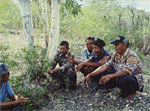In Search of Silenced Voices
This is a collection of interviews with Indonesian exiles recorded by Hersri Setiawan and deposited at the IISH.
Hersri (born in Yogyakarta in 1936) studied sociology at the Gadjah Mada University in Yogyakarta and also attended the Academy of Drama and Film there. From 1961 to 1965 he was the Indonesian representative to the Society of Writers from Asia and Africa in Colombo. Following his return to Indonesia, he became a staff member of the Universitas 17 Agustus di Jakarta. From 1969 to 1978 he was a political prisoner (tapol) in Jakarta and on the island of Buru. Since 1985 he has lived in the Netherlands, where he worked as a translator. Hersri recorded the interviews in In Search of Silenced Voices in the late 1990s in several countries in Europe and in Asia.
The objective of the oral history project In Search of Silenced Voices was to collect individual life histories by interviewing those Indonesian political emigrés still living in Western Europe, China, Vietnam, and Indonesia. The life histories describe their activities as members of the Indonesian leftist intelligentsia before 1965 as well as the diaspora they experienced after 1965. The recordings include political roles as well as personal experiences over three successive periods:
- in Indonesia before 30 September 1965
- abroad after 30 September 1965
- as emigrés in the countries they now make their homes.
The interviews, recorded by Hersri Setiawan, are mostly in Indonesian. They are very important in two ways: first, they include materials containing unique data on the history of the leftist movement in Indonesia before 1965, which has not yet been collected anywhere else. This history has been systematically suppressed by the Orde Baru (New Order) of President Soeharto. The life stories also contain information on the relationship between members of various leftist organizations and their grassroots support, along with the various strategies for mobilizing mass support as well as the internal dynamics of the mass organizations.
Second, the interviews provide crucial information on the leftist diaspora after 1965 that will enable future researchers to write a history of this forgotten group. The life stories of about 50 people were recorded in The Netherlands, England, France, Germany, Sweden, China, Vietnam, and although it was not included in the initial project plan, also in Indonesia. Some of the interviews are relatively brief (1-3 tapes of 90 minutes each), while others consist of 20 tapes that contain unique biographies, which would otherwise have been lost. In total, the IISH now has a collection of more than 200 tapes, comprising an archive of about 300 hours of oral history. The interviews and other recordings were given to the IISH by the interviewer and researcher of the project, Hersri Setiawan, and are for most part free for consultation.
As a result of the project, nearly 3,000 pages of written and printed documents have been collected: including letters, reports, memoirs, and documentation by Indonesian exiles about the Indonesian left. They include the LEKRA (Institute of People's Culture), the trade union movement, the Partai Komunis Indonesia (PKI, Communist Party of Indonesia), and other organizations. There is also an Indonesian translation of Das Kapital by Karl Marx and a history of the PKI. See the list for the Indonesian Exiles of the Left.
Browse through a list of interviewees or listen to some parts of the interviews of Agam Wispi and Francisca C. Fanggidaej
See also the archives and collections at the IISH of Jeanne van Ammers, Martha Meijer, Oei Tjoe Tat, Poncke Princen, Adam Soepardjan, Soerjono and Suparna Sastradiredja, and of Amnesty International, Komitee Indonesië [Dutch Committee Indonesia], and Tapols (Indonesian political prisoners).


